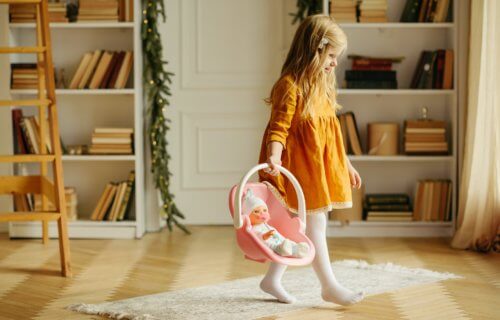CARDIFF, Wales — Playing with dolls can help children consider what other (real) people may say or feel — improving their social skills when they interact with others. Researchers from Cardiff University and King’s College London say they found increased activity in children’s brains within a region that supports emotional development after the youngsters played with dolls instead of tablets or mobile devices.
The results of this multi-year study reveal doll play led to children talking more about others’ thoughts and emotions. Scientists call this concept internal state language (ISL). Thirty-three children between the ages of four and eight took part in the study, which found that children displayed more ISL when playing with dolls than they did while using digital toys.
Study authors explain that internal state language allows kids to practice their social skills while they’re alone, making real word interactions smoother later on. Moreover, the team found increased brain activity in the posterior superior temporal sulcus (pSTS) region when children played with their dolls and spoke as though the toys had their own thoughts and feelings.
The pSTS has a deep connection to the development of a person’s social and emotional processing skills.
“When children create imaginary worlds and role play with dolls, they communicate at first out loud and then internalize the message about others’ thoughts, emotions and feelings,” says lead researcher Dr. Sarah Gerson in a university release.
“This can have positive long-lasting effects on children, such as driving higher rates of social and emotional processing and building social skills like empathy that can become internalized to build and form lifelong habits.”
More brain activity after playing with dolls
The study, conducted by experts at Cardiff’s Centre for Human Developmental Science and commissioned by Barbie doll maker Mattel, used state-of-the-art, functional near-infrared spectroscopy equipment to examine a child’s brain activity while they played with either dolls or tablets. The children did this both by themselves and with other people present.
Results of the scans show playing with dolls created more ISL than playing with tablets. More ISL also had a link to an increase in pSTS activity.
“ISL can indicate that a child is thinking about other people’s thoughts and emotions while playing with dolls,” Dr. Gerson says. “These skills are really important for interacting with other people, learning from other people, and navigating a variety of social situations. It becomes important for making and sustaining friendships, and how they learn from their teachers, and parents.”
“We look forward to uncovering even more benefits of doll play, grounded in neuroscience, through our long-term partnership with Cardiff University,” adds Lisa McKnight, Senior Vice President and Global Head of Barbie and Dolls at Mattel.
The study is published in the journal Developmental Science.
